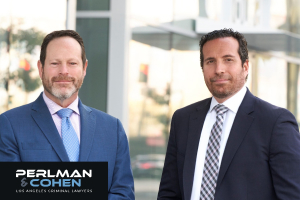
Facing a domestic violence charge in California is a serious matter that can change your life. The law takes these offenses very seriously. From your freedom to your job prospects, the impacts are far-reaching. At Perlman & Cohen Criminal Lawyers, we understand the gravity of these charges and are here to provide the defense you need. Each domestic violence crime is prosecuted vigorously, and a domestic abuse conviction can be life-changing.
Severe consequences may follow a domestic violence conviction in California. Common examples include prison time, fines, and mandatory programs. Furthermore, domestic violence offenses can significantly affect your employment opportunities and your ability to hold professional licenses. The social and personal repercussions of domestic violence charges are also profound, impacting your relationships and your reputation. Our Los Angeles domestic violence defense attorneys are committed to offering you the strongest possible defense to protect your rights and future. Learn more about domestic violence cases and felony domestic violence charges below. Then, contact us to discuss your domestic violence case.
A domestic violence conviction can result in harsh legal penalties. The specific consequences depend on whether the court treats your case as a misdemeanor or a felony. Factors such as the severity of the alleged harm, previous convictions, and a restraining order can influence the sentencing.
For a misdemeanor domestic violence conviction, the law may require you to serve time in county jail for up to one year. Felony convictions can lead to longer sentences, possibly in state prison, depending on the case's specifics. Probation is also a common sentence, requiring you to follow strict rules and avoid further legal trouble. Under California Penal Code Section 273.5, felony domestic violence can result in up to four years in state prison, while Penal Code Section 243(e)(1) outlines penalties for misdemeanor domestic battery, including up to one year in county jail.
Probation terms might include attending counseling sessions, performing community service, and regularly meeting with a probation officer. During this period, any violation of probation terms can result in serving a suspended jail sentence. These laws aim to prevent future offenses and ensure the accused receives the necessary intervention to address underlying issues.
In addition to jail time, fines are a standard penalty for domestic violence convictions. These fines can be substantial, often running into thousands of dollars. The court may also require you to complete mandatory domestic violence counseling programs, which can last for up to a year. According to California Penal Code Section 1203.098, those convicted of domestic violence must complete a minimum 52-week batterer's intervention program.
These programs are designed to address the behaviors and attitudes that contribute to domestic violence. They aim to educate and rehabilitate, reducing the likelihood of future offenses. The cost of these programs, combined with court-imposed fines, can create a significant financial strain for the accused. Domestic violence in California is taken seriously, and a felony conviction can change your life permanently.

Domestic abuse convictions can seriously damage your career prospects.
You might lose your current job if you're convicted, particularly if your role involves working with vulnerable groups. This includes children or the elderly. Future job searches can become more challenging, as employers could be nervous about hiring someone with a domestic violence conviction. This stigma can limit your opportunities and make it difficult to find stable employment.
In some industries, especially those requiring security clearances or handling sensitive information, a domestic violence conviction can be an automatic disqualifier. The loss of employment and the associated financial stress can have far-reaching effects on your life and well-being.
Professional licenses and certifications in sectors like healthcare, law, and education may be revoked or denied if you have a California domestic violence conviction. Licensing boards often consider such convictions as indicative of a person's character and suitability for the profession. You may be required to disclose your conviction on applications, which can lead to disqualification or the need to appear before a licensing board to plead your case.
Even if you retain your license, the conviction can smear your professional reputation. This makes it harder to advance in your career. The impact can be particularly devastating for those in careers where trust and integrity are paramount.
One of the immediate consequences of a domestic violence conviction is the forfeiture of your right to own or possess firearms. This restriction applies not just for the duration of any probation or parole but often indefinitely.
Under federal law, individuals convicted of a misdemeanor or felony domestic violence offense are prohibited from owning firearms. California law also imposes strict gun ownership bans on individuals convicted of domestic violence crimes. This means that if you're convicted, you must surrender any firearms you own and cannot purchase new ones.
The rationale behind these laws is to prevent future violence. Studies have shown that the presence of a gun in domestic violence situations significantly boosts the risk of homicide. Losing the right to own a gun can be a significant adjustment, especially for those who previously owned guns for personal safety or as part of their cultural lifestyle.

The effects of a domestic violence conviction go beyond legal penalties and can deeply affect your personal life and relationships.
A domestic violence conviction can be a black mark on your reputation, making it difficult to maintain personal relationships. Friends and family may distance themselves, and the stigma associated with the conviction can lead to social isolation. This can be one of the most challenging aspects to navigate, as it affects your support network and sense of belonging.
The public nature of criminal proceedings means that your case may become a matter of public record, accessible to anyone who searches for it. This can impact your social standing and relationships for years to come, long after any legal penalties have been served.
Finding housing can be particularly challenging with a domestic violence conviction on your record. Landlords often conduct background checks. They are likely hesitant to rent to someone with a criminal history of domestic or spousal abuse. This can limit your housing options and force you to live in less desirable locations or conditions.
In addition, certain housing programs and assistance may be unavailable to individuals with a domestic violence conviction. The combination of employment and housing challenges can make rebuilding your life after a conviction an uphill battle.
At Perlman & Cohen Criminal Lawyers, we are committed to defending those accused of domestic violence with a comprehensive and strategic approach. Here are how we can help:
We're here to stand up for you, fighting hard to make sure your side of the story gets the attention it deserves. Let us take on the battle for you, using our skills and knowledge to aim for the best outcome possible.

If you're facing domestic violence charges, time is of the essence. Contact Perlman & Cohen Criminal Lawyers today to schedule a consultation. Our experienced Los Angeles domestic violence defense attorneys know that you deserve the strongest possible defense.
Don't let a domestic violence charge define your future. With our help, you can challenge the charges against you and seek a more favorable outcome. Call us now to learn how we can defend your rights and provide the strongest possible defense. Together, we can work towards the best possible resolution of your case.
"*" indicates required fields






If you or a loved one needs the assistance of our criminal law attorneys, please feel free to contact us in the way that is most convenient to you, whether that is calling us at (310) 557-1700 or completing the contact form below. All fields are required.